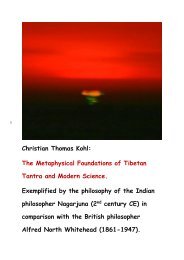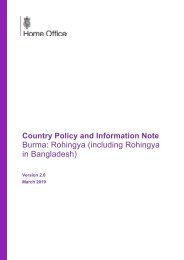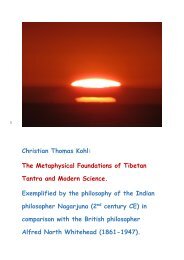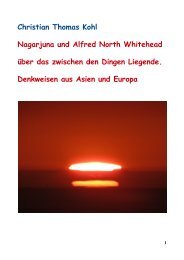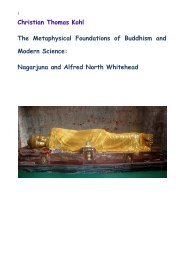The Metaphysical Foundation of Buddhism and Modern Science
You also want an ePaper? Increase the reach of your titles
YUMPU automatically turns print PDFs into web optimized ePapers that Google loves.
making <strong>and</strong> as working with information, without concern as to what phenomena<br />
the information is about. What philosopher Donald Davidson (1917-2003) said<br />
about subjectivism, might be true for instrumentalism also: “Once one makes<br />
the decision for the Cartesian approach, it seems that one is unable to indicate<br />
what one’s pro<strong>of</strong>s are evidence for”. [8]<br />
For instrumentalism, theories are not a description <strong>of</strong> the world but an<br />
instrument for a systematic classification <strong>and</strong> explanation <strong>of</strong> observations, <strong>and</strong><br />
for the prediction <strong>of</strong> facts.<br />
<strong>The</strong> instrumentalist approach is outlined by the experimental physicist Anton<br />
Zeilinger who stated in an interview, “In classical physics we speak <strong>of</strong> a world<br />
<strong>of</strong> things that exists somewhere outside <strong>and</strong> we describe their nature. In<br />
quantum physics we have learned that we have to be very careful about this.<br />
Ultimately physical sciences are not sciences <strong>of</strong> nature but sciences <strong>of</strong><br />
statements about nature. Nature in itself is always a construction <strong>of</strong> mind.<br />
Niels Bohr once put it like this: ‘<strong>The</strong>re is no world <strong>of</strong> quantum, there is only a<br />
quantum mechanical description’”. [9]<br />
Nagarjuna’s viewpoint.<br />
Nagarjuna presents these four extreme views <strong>of</strong> reality in a scheme that is<br />
called in Sanskrit: ‘catuskoti’, the equivalent <strong>of</strong> the Ancient Greek ‘tetralemma’,<br />
as follows: things have no substance: 1. neither out <strong>of</strong> themselves, 2. nor out <strong>of</strong><br />
something else, 3. nor out <strong>of</strong> both, 4. nor without a cause. (tetralemma: a<br />
figure in Ancient Greek <strong>and</strong> Eastern logic with four possibilities.) This kind <strong>of</strong><br />
tetralemma refutes the four modern views <strong>of</strong> reality as above mentioned. This








